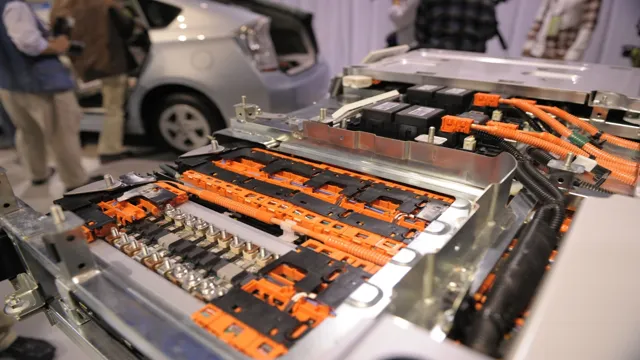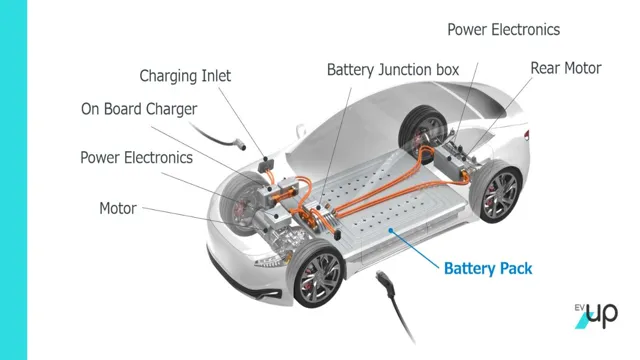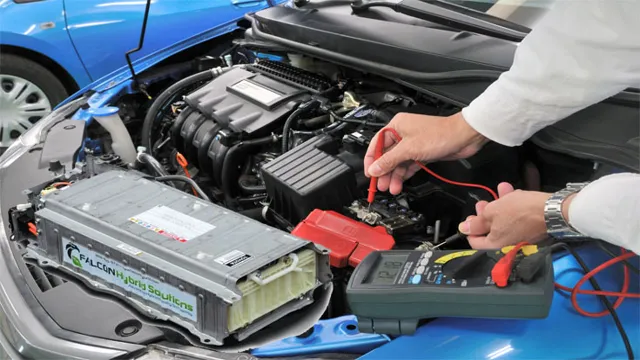Lighten Up Your Ride: Why Electric Car Battery Weight Matters
Electric cars offer a cleaner and more efficient alternative to traditional petrol and diesel vehicles. However, many wonder about the weight of electric car batteries and how it affects the performance of these vehicles. As electric cars become more popular, the size and weight of their batteries continue to be a hot topic for discussion.
To understand the weight of electric car batteries, we need to look at the technicalities of these vehicles. Electric cars rely heavily on batteries to store energy, and these batteries are typically made of lithium-ion. They are heavy and made up of multiple cells that contribute to the overall weight of the car.
The weight of electric car batteries can be a concern for some drivers, as it affects the driving range and overall performance of the vehicle. However, it’s essential to keep in mind that with advancements in technology, the weight of batteries is decreasing while their storage capacity is increasing. So, are electric car batteries too heavy? The answer is not so straightforward.
While they do add to the weight of the vehicle, their benefits in terms of sustainability and reduced carbon emissions outweigh the cons. Additionally, electric car manufacturers are continually innovating and looking for ways to reduce weight and increase performance. Overall, the weight of electric car batteries is a topic worth discussing, but it is not a deal-breaker for drivers.
As technology continues to improve, we can only expect electric cars to become lighter, more efficient, and accessible to a broader range of people.
Overview of Electric Car Batteries
When it comes to electric car batteries, weight is a crucial factor to consider. Battery weight affects the car’s range, handling, and overall performance. Electric car batteries are made of lithium-ion cells, which are lighter and more powerful than lead-acid batteries.
Lithium-ion batteries have a higher energy density, which means that more energy can be stored in a smaller size and weight. However, even with these advancements, electric car batteries are still relatively heavy compared to traditional gas-powered vehicles. The weight of an electric car battery pack can range from 500 to 1,200 pounds, depending on the car model and battery size.
Car manufacturers are constantly working on improving the design and materials used to make batteries lighter, to extend the car’s range and make it more efficient. A lighter battery pack will also make the car easier to handle and improve its overall driving dynamics. So, while weight is a critical consideration, it’s not the only factor to consider when it comes to electric car batteries.
Chemistry of Electric Car Batteries
Electric car batteries have become increasingly popular in recent years due to their environmentally-friendly nature and low maintenance requirements. These batteries use a combination of electrochemical reactions to store and release energy, which is then used to power the electric motors that drive the vehicle. The most common type of electric car battery is a lithium-ion battery, which is made up of a cathode, an anode, and an electrolyte solution.
The cathode and anode are made up of materials such as graphite and lithium cobalt oxide, which react with the electrolyte solution to create a flow of ions between the two electrodes. This reaction produces an electrical current that is then stored within the battery until it is needed to power the electric motor. While electric car batteries have come a long way in terms of their energy density and reliability, there is still much research being done to find ways to improve their efficiency and reduce their cost.

Types of Electric Car Batteries
Electric car batteries are a crucial component of any electric car, as they store the energy required to power the vehicle. There are three main types of electric car batteries: lithium-ion, lead-acid, and nickel-metal hydride. Lithium-ion batteries are the most commonly used type of electric car battery, as they are known for their high energy density and long lifespan.
Lead-acid batteries are an older technology, but they are still used in some electric cars because they are relatively inexpensive. Nickel-metal hydride batteries are not as common as lithium-ion batteries, but they are still used in some electric cars because they are highly efficient. Regardless of the type of electric car battery, all types require periodic maintenance and eventual replacement.
Weight of Electric Car Batteries
Electric car batteries are an essential component of electric vehicles, providing the energy needed for the motor to run. But have you ever wondered how much they weigh? You might be surprised to know that the weight of electric car batteries can range from just a few hundred pounds to over a thousand pounds depending on the capacity of the battery. Larger batteries with a higher capacity can provide longer driving range and require more materials, which ultimately leads to heavier weight.
It’s important to note that the weight of the battery affects the performance of the vehicle, including handling, braking, and energy efficiency. Manufacturers are constantly exploring lighter and more efficient materials to reduce the weight of these batteries without sacrificing performance or reliability. As electric vehicle technology continues to improve, we can expect to see even lighter and more energy-dense batteries in the future.
Average Weight of Electric Car Batteries
The weight of electric car batteries is often a concern for drivers who are looking to make the switch from gas-powered to electric vehicles. On average, electric car batteries can weigh anywhere from 500 to 1,500 pounds, depending on the make and model of the vehicle. This weight can impact the car’s overall performance and handling, as well as its range.
However, advancements in battery technology have led to lighter and more efficient batteries that are able to deliver the same amount of power while reducing the overall weight of the car. With ongoing innovation in electric vehicle technology, drivers can expect to see even lighter and more powerful batteries in the future. So if you’re considering making the switch to an electric car, don’t let the weight of the battery hold you back – it’s just one factor to consider among many when making your decision.
Factors Affecting Electric Car Battery Weight
The weight of electric car batteries is a major consideration for both car manufacturers and consumers. There are several factors that can affect the weight of these batteries. Firstly, the type of battery technology used can play a significant role in determining its weight.
Lithium-ion batteries are commonly used because they have a high energy density, which means they can store more energy in a smaller space. However, they can be heavy, which can impact the overall weight of an electric car. Secondly, the size of the battery pack can also affect its weight.
The larger the battery pack, the more cells it contains, which means it will weigh more. Lastly, the range of the car can also be a determining factor. A larger range requires a larger battery pack, which can weigh more.
Despite these factors, car manufacturers continue to work towards reducing the weight of electric car batteries to increase the efficiency of their vehicles.
Comparison to Gasoline Car Batteries
When it comes to comparing electric car batteries to gasoline car batteries, one important factor to consider is weight. Electric car batteries are much heavier than their gasoline counterparts, as they need to store much more energy to power the vehicle. While a typical gasoline car battery may weigh just a few pounds, an electric car battery can weigh hundreds or even thousands of pounds, depending on the size of the vehicle and the battery capacity.
But while the weight of electric car batteries may seem like a downside, it actually has some benefits. For one, the added weight can make electric vehicles more stable and easier to handle, especially at high speeds. Additionally, the heavy battery pack can also act as a form of ballast, helping to improve the car’s overall center of gravity and balance.
Of course, the weight of electric car batteries can also be a drawback. Heavier batteries mean reduced range, as more energy is required to move the added weight. This is something that manufacturers are working to address, however, with new battery technologies and improved energy efficiency.
Overall, the weight of electric car batteries is just one of many factors to consider when comparing them to gasoline car batteries. While it may be a downside in some ways, it also has some benefits that can help to improve the overall safety and handling of electric vehicles. Ultimately, the choice between electric and gasoline cars will depend on a variety of factors, including personal preferences, driving needs, and environmental concerns.
Impact of Battery Weight on Electric Cars
Electric car batteries weight has a significant impact on the overall performance of the vehicle. The more massive the battery, the harder it is for the car to move, which leads to decreased efficiency and range. This is why manufacturers are always trying to find ways to reduce the weight of the battery while maintaining its capacity and durability.
One solution is to switch from heavier materials, such as nickel-cadmium and lead-acid, to lighter lithium-ion batteries. These batteries can store more energy per unit of weight, making them a popular choice for electric vehicles. Additionally, some electric cars are designed with the battery pack located under the floor, which provides a lower center of gravity and improves stability.
Although battery weight is a crucial consideration, it’s not the only factor that affects electric car performance. Aerodynamics, motor efficiency, and tire resistance also play a significant role in determining the range and efficiency of an electric vehicle.
Effect on Range and Performance
When it comes to electric cars, the weight of the battery can have a significant impact on both range and performance. This is because batteries are heavy, and the more weight an electric car has to carry, the more energy it needs to move. As a result, heavier batteries mean shorter ranges and slower acceleration times.
However, advancements in battery technology are making it possible to produce lighter batteries with higher energy densities, which can help offset some of the performance and range issues associated with heavier batteries. Ultimately, the impact of battery weight on electric cars depends on a variety of factors, including the size and power of the battery, the design of the car, and how it is driven. By considering these factors, electric car manufacturers can help optimize the performance and range of their vehicles while also improving overall efficiency.
Efforts to Reduce Battery Weight
Electric cars have taken the automobile industry by storm, with their eco-friendliness and efficient driving. However, one major challenge that comes with electric cars is their battery weight. Battery weight has a significant impact on the car’s overall performance and fuel efficiency, affecting the speed, mileage, and range of the vehicle.
With that in mind, efforts are being made to reduce the weight of the batteries used in electric cars. This includes implementing lighter and more powerful materials in battery construction, such as solid-state batteries, which have shown to be lighter and more efficient than traditional lithium-ion batteries. Additionally, innovative designs such as the use of honeycomb structures instead of solid cores for battery casing are being explored.
By reducing the weight of electric car batteries, automakers can improve the overall performance and efficiency of electric cars, making them more appealing to consumers in the long run.
Conclusion
In the world of electric cars, weight is the enemy. Every extra pound of weight requires more battery power to be used, which results in lower range and decreased performance. It’s no secret that the batteries are the heaviest component in an electric car, but as technology advances, the hope is that their weight will become less of a burden.
Until then, every ounce counts and electric car manufacturers are constantly seeking ways to improve battery technology and reduce weight, ensuring a brighter and lighter future for electric vehicles.”
FAQs
How much do electric car batteries weigh?
The weight of electric car batteries varies depending on the make and model of the car. On average, they can weigh between 500 and 1,000 pounds.
What factors affect the weight of electric car batteries?
The weight of electric car batteries is influenced by several factors, including the battery technology used, the size and capacity of the battery, and the number of cells required to power the car.
Do heavier batteries affect the performance of an electric car?
Yes, heavier batteries can affect the performance of electric cars. They can reduce the car’s overall efficiency and range, as more energy is required to move the car’s weight.
Are there ways to reduce the weight of electric car batteries?
Yes, researchers are constantly exploring ways to reduce the weight of electric car batteries, such as using lighter materials and developing more efficient battery designs. Additionally, car manufacturers are making efforts to optimize the overall weight of electric cars to improve performance and range.

![Powering the Future: How [Battery Company Name] Propels Electric Cars to New Heights](https://electriccarwiki.com/wp-content/uploads/2023/12/battery-company-electric-car.webp)



